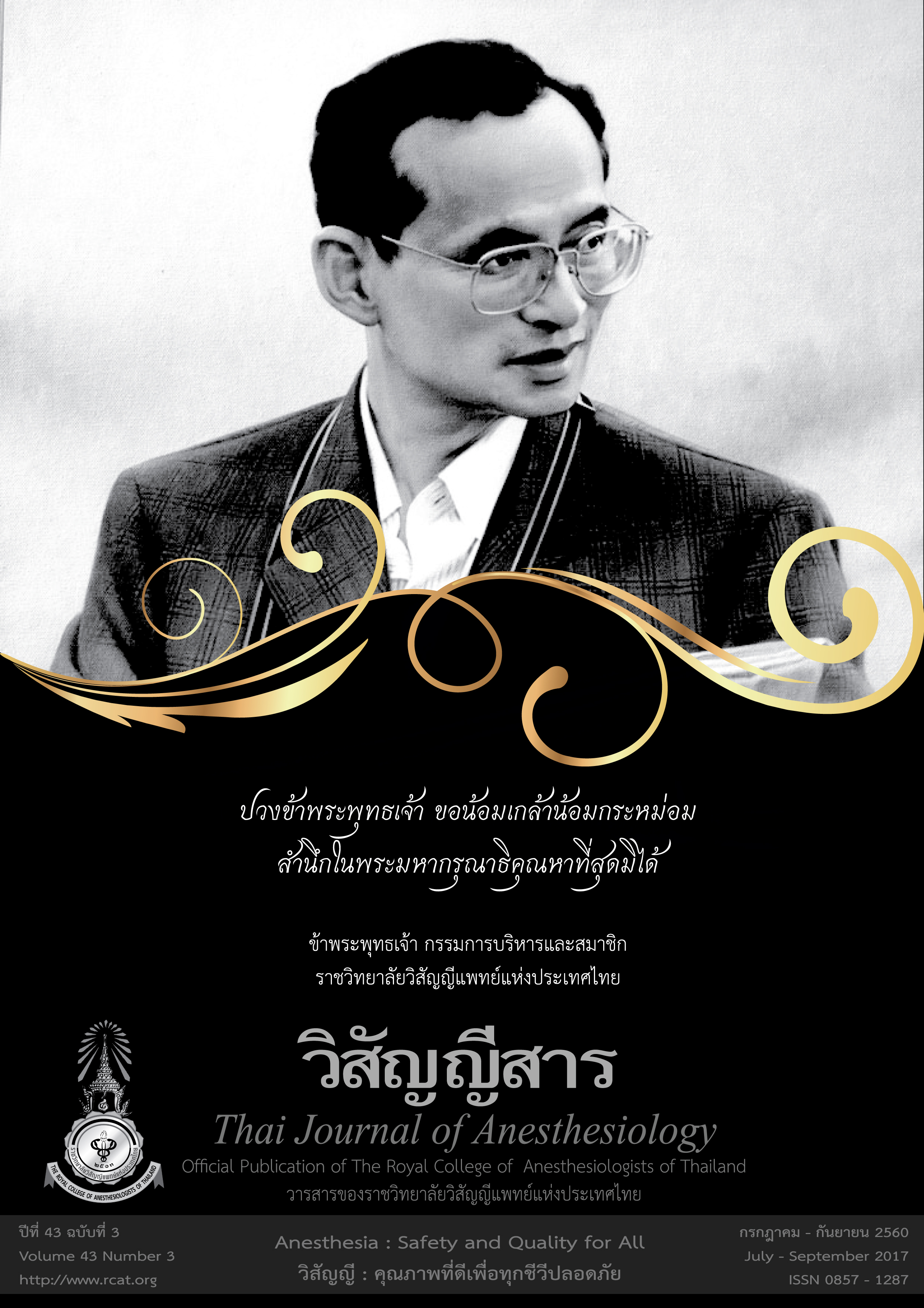Results of the workshop on prevention and control of infectious diseases in anesthesia practice in Siriraj Hospital
Main Article Content
บทคัดย่อ
Background: The prevention and control of
infectious diseases in anesthesia practice is an
important issue. The role of anesthetic personnel
needed to be done. The purpose of this study is to
assess the outcomes of the workshop on prevention
and control of infectious diseases in anesthesia
practice in Siriraj Hospital. Methods: The interventions
consisted of knowledge, basic intervention and
practical simulation on prevention and control of
infectious diseases. The evaluation consisted of
knowledge response and behavior change as well as
departmental outcome. The content validity of the
questionnaire and assessment of the interventions
were evaluated by an expert by using “normalized gain”.
Data were analyzed by using the descriptive statistics
including percentage as well as mean and standard
deviation. Results: Twenty seven residents in
anesthesiology and 39 anesthetic nurse students were
enrolled in the study. The study demonstrated that
the reaction in both groups was high. In all participants,
the learning after intervention was significantly
greater than the baseline. Additionally, the participant’s
behavior in both groups was acceptable. For department,
all interventions were completed except in hand
hygiene and washing time. Conclusion: The results
of the workshop on prevention and control of
infectious diseases for residents in anesthesiology
and anesthetic nurse students in anesthesia practice
in Siriraj Hospital is relatively high in all aspects.
In addition, the results of this study could be used
as indicators for improvement in routine anesthesia
practice. However, a sample size of the study is
relatively small. Further studies need to be confirmed.
Article Details
เอกสารอ้างอิง
Siriraj Hospital. Guidelines for prevention and control of infectious diseases. Bangkok: Siriraj Hospital; 2014.
2. Office of the Civil Service Commission. Documentation
of the lecture: “Training process” for basic training course.
Bangkok: Office of the Civil Service Commission; 1989.
3. Kityunyong S, Na Taguatung O. Training techniques.
5th ed. Bangkok: Technology Promotion Association
(Thailand-Japan); 2007.
4. Tiviraj S, Yokubol B, Amornyotin S. Development of an
assessment test for an anesthetic machine. J Med Assoc
Thai. 2016;99: 629-35.
5. Kirkpatrick D. Kirkpatrick’s Four-level training
evaluation model: Analyzing training effectiveness. [cited
2016 Sep 9]; Available from: https://www.mindtools.
com/pages/article/kirkpatrick.htm.
6. Kirkpatrick D. Kirkpatrick’s Training Evaluation Model.
[cited 2016 Sep 9]; Available from: http://www.
kirkpatrickpartners.com/Our-Philosophy/The-
Kirkpatrick-Model.
7. Kirkpatrick DL., Kirkpatrick JD. Evaluating training
programs: the four levels. 3rd ed. San Francisco:
Berrett-Koehler; 2006.
8. Ritcharoon P. Research for the development of
classroom research. 3rd ed. Bangkok: Phranakhon
Rajabhat University; 2002.
9. Chua-on S. Effectiveness of laboratory group
investigation model in science classroom. Veridian
E-J SU. 2011;4(1):645-51.
10. Jindanukul A. Workshop training report: creating
computer assisted instruction. Bangkok: Department of
General Education; 2002.
11. Vincent P, Jeffrey A. Interpreting scores: Normalized,
pre-instruction scores, and scientific reasoning ability.
[cited 2016 Sep 12]; Available from: http://myweb.lmu.
edu/jphillips/PER/interpreting_fci.pdf.
12. Amornyotin S. Anesthesia innovations for endoscopy
of gastrointestinal tract. In: Amornyotin S, editor.
Endoscopy-innovative uses and emerging technologies.
Croatia: InTech; 2015. p. 39-61.
13. Parakkamodom S, Chainchop P, Napachoti T,
Apidechakul P, Puangchan S, Papiroon P, et al. Quality
of anesthesia care in a university hospital in Thailand.
J Med Assoc Thai. 2016;99(5):622-8.


